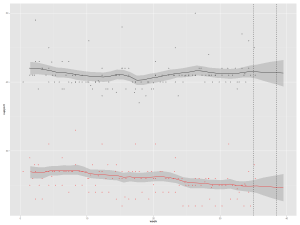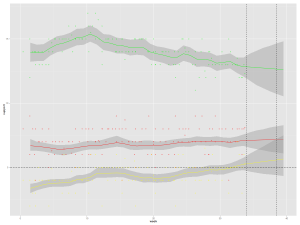The Polls

Exactly three weeks before the 18th Bundestag election, it’s time for another look at the polls. This weekend brings six new entries: One late result from week 33 that was only published a week ago, three polls from week 34, and two that were conducted this week, with fieldwork done from Monday/Tuesday to Wednesday. For all purposes and intents, that means that any possible fallout from the Western (non-)intervention in Syria will not be reflected in the polls.
Raw Figures, Estimates and Predictions
As always, there is a good deal of variation in the published figures. The range for Merkel’s Christian Democratcs, for example, is 41 to 46 per cent. But for what it is worth, the model is ever more confident about the outcome of the election: The estimated probability of victory for the governing coalition is now 85 per cent (up from 78 per cent) even if one ignores tactical voting by CDU supporters. If this “loan vote” is factored in, the probability of a coalition victory is 94 per cent (up from 90). Unsurprisingly, the probability of a Red-Green majority is still estimated as zero.

The one remarkable change is the modest slump in support for the Greens, which have lost about two points over the last four weeks and are now well below their peak support of about 15 per cent in March. The slow upward trend of the Liberals is unbroken, and the Left is safely above the electoral threshold. Support for the two major parties is perfectly stable.
Since my interest here is (mostly) academic, I also began comparing past predictions (from week 33) with current estimates. The differences are small, but there is one interesting exception: Support for the Greens is now estimated to be 0.8 points lower than it should have been, given the information that was available two weeks ago. So it would seem that their support is indeed suffering from some random shock.
The Outlook
Today is the day of the televised debate between Steinbrück and Merkel (in Germany, known as “the Duel”). While we are professionally obliged to watch it, I don’t think that it will make much of a difference. Both candidates are extremely well known knowns. I also don’t think that Syria will matter for this campaign.
Have I just shot myself in the foot? Probably. Come back next week for the latest batch of surveys.
Discover more from kai arzheimer
Subscribe to get the latest posts sent to your email.


Dat ‘kelderen in de peilingen’ van de Groenen is eerder een “modest slump” volgens Duitse versie vd Peilingwijzer. http://t.co/wovrzZ8Pba
De beste methode om krachtsverhoudingen in beeld te brengen blijft aggregeren van peilingen. Voor Duitsland: http://t.co/wovrzZ8Pba
Juergen Lass You are absolutely right, but share of undecided voters not published by all companies. I weigh down the number of respondents by a factor of 0.8 to propagate some of the uncertainty, but that’s clearly a second-best solution.
I would be great to have a chart which includes the “not decided voters”. Then we may see stronger movements (I expect that more or less all parties started to mobilize “their own” supporters. Looking on the charts the impression is: 1) FDP and Die Linke become stronger by mobilizing their “fans” 2) CDU stable 3 ) SPD and Grüne frustrate their followers. But it looks a little bit “sleepy”. Perhaps there is more movement behind the surface than we see. After this “TV-Duell I don’t expect a real impact on the political attitudes too…
You are absolutely right, but share of undecided voters not published by all companies. I weigh down the number of respondents by a factor of 0.8 to propagate some of the uncertainty, but that’s clearly a second-best solution.
Om tyske meningsmålinger: “@kai_arzheimer: @olafcramme Mostly noise: http://t.co/zHTzPifNxj”
German Bundestag Election: Six New Polls, Little Change http://t.co/LW0ZfcItoR via @kai_arzheimer